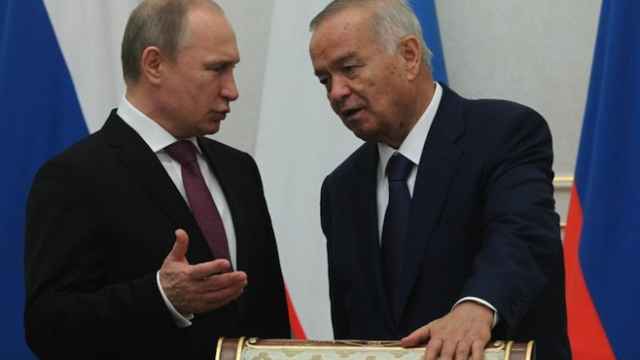Uzbekistan's election commission said more than 70 percent of eligible voters had cast their ballots by midway through Sunday's presidential election, where victory by longtime leader Islam Karimov is a foregone conclusion.
The 77-year-old Karimov has led the former Soviet republic in Central Asia since the late 1980s and ruthlessly quashed all opposition to his rule.
While Uzbekistan is untroubled by any immediate signs of unrest, the future of the country of 30 million people is colored with uncertainty amid a troubled security situation in neighboring Afghanistan and lack of a clear succession plan should Karimov suddenly leave the scene.
Economic woes could also be in store as a knock-on effect of the looming recession in Russia, where around 3 million Uzbeks live and work.
At a briefing reported by Russian news agencies, Central Election Commission chairman Mirzo-Ulugbek Abdusalomov said turnout hit nearly 72 percent by 1 p.m., with polls open for another seven hours.
Karimov faces three purely nominal rivals. In the previous election in 2007, he won 91 percent of the vote.
A Russian parliament member who served as an election observer, Ilyas Umakhanov, said the citizens of Uzbekistan were voting for "further guarantees of stability and the social-economic development of the country," the Russian state news agency RIA Novosti reported.
Since gaining independence in 1991, Uzbekistan has pursued a policy of economic self-reliance and sought to balance its diplomatic relations with the West and Russia, playing them against each other.
The United States installed a military base in the country after the Sept. 11, 2001 terrorist attacks. It was forced to abandon that facility in 2005 as relations between the countries soured following a violent government crackdown on rioters in the Fergana Valley city of Andijan that is believed to have left hundreds dead.
Almost all Western media have been barred from reporting inside the country since that time. Independent journalists and activists face sustained harassment.
A Message from The Moscow Times:
Dear readers,
We are facing unprecedented challenges. Russia's Prosecutor General's Office has designated The Moscow Times as an "undesirable" organization, criminalizing our work and putting our staff at risk of prosecution. This follows our earlier unjust labeling as a "foreign agent."
These actions are direct attempts to silence independent journalism in Russia. The authorities claim our work "discredits the decisions of the Russian leadership." We see things differently: we strive to provide accurate, unbiased reporting on Russia.
We, the journalists of The Moscow Times, refuse to be silenced. But to continue our work, we need your help.
Your support, no matter how small, makes a world of difference. If you can, please support us monthly starting from just $2. It's quick to set up, and every contribution makes a significant impact.
By supporting The Moscow Times, you're defending open, independent journalism in the face of repression. Thank you for standing with us.
Remind me later.





